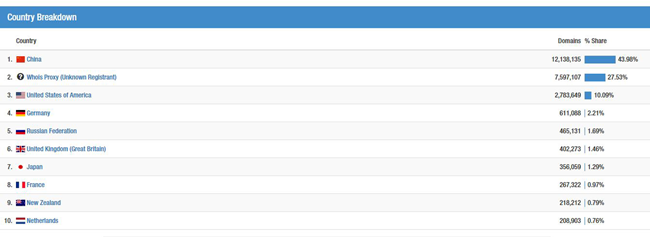:: By Jeff Sass, .CLUB Domains ::
Whether or not they understand all of the complexities surrounding it, most Americans probably know something about the Great Firewall of China. Built in about 1988 - a little later than the one meant to keep out invading armies - the Great Firewall serves to block any website the Chinese government deems inappropriate for public consumption.
With such major sites as Google, Twitter, and Facebook banned, it might seem like China is not a very welcoming market for the Internet. On the contrary, when it comes to domain names, China has emerged as a driving force in domain name registrations, especially for new domain extensions such as .CLUB, .TOP and .VIP. According to ntldstats.com, of the 27,567,175 new domains registered as of Jan. 9, 2017, China accounted for 12,138,135, or 44 percent.
That said, foreign domain name registries trying to break into the Chinese market have their work cut out for them. There are some stiff barriers to entry, but entrepreneurs who navigate the hurdles to enter the Chinese market could now find immense rewards waiting on the other side.
Online China's Evolving Landscape
Any website hosted in mainland China is required to have an Internet content provider number. An ICP number is registered to a specific individual, which allows the government or any other interested party to trace the ownership of any Chinese-hosted website. Unlike in the U.S., creating an anonymously owned website in China simply isn't feasible.
Up until very recently, only Chinese-owned registries were authorized to have ICP numbers issued for their domain names. Last year, Verisign, operator of .COM and .NET, received its license from the Chinese government. Additionally, in December, three of the new top-level domain operators - the registries for .CLUB, .VIP and .XYZ - became the first of the Western-owned new domains to be approved.
This is good news for the approved domain registries and could mean that the wait won't be too much longer for others that have applied for their licenses from China's Ministry of Industry and Information Technology.
Nonetheless, the approval process can be lengthy and costly, requiring the establishment of a Chinese-based entity and staff, as well as technical requirements surrounding the operation of the domain name service.
Why Is China Worth It?
Why should registries care so much about getting into the Chinese market? Two reasons:
1. China has an enormous consumer base.
It's not exactly a secret that China is home to a whole lot of people. Anyone who can tap into even a small fraction of that market stands to see some serious revenue.
China has also grown to become very commercial and consumer-oriented. Luxury brands have a strong presence, with Ferraris and Bentleys all over Beijing, and some of the world's most exotic and expensive shopping malls flourish on Chinese soil.
How does all this money keep flowing? In short, China's booming upper-middle class. China now has more than 1.12 million residents with more than $1.4 million in investable assets, and its urban population is expected to go from just 12 percent upper-middle class in 2012 to 54 percent upper-middle class by 2022.
That's a lot of people with a ton of purchasing power, and they know how to use it. China's boom in wealthy individuals is indicative of a generation filled with active online users and mobile technology enthusiasts. Anyone who can capture the attention of this audience stands to gain tremendous market share in a demographic with a great deal of disposable income.
2. Domains trade like stocks in China.
Toward the end of 2015, domain names in China were selling like hotcakes because Chinese investors didn't see them as business assets, but as valuable investments - almost as a liquid currency that will only increase in value.
Because they were not approved for active websites yet, new domain names were not being bought by businesses wanting as much as they were being snatched up by domain investors who want to trade them amongst themselves, focusing on short letter and numeric domains, ideally with a short extension to the right of the dot.
Similar to how people traded baseball cards or Pokemon cards, domain investors collect a portfolio of domain names and then sell them at a higher price than they bought them to another investor, who will then try to sell them to another investor at an even higher price. Now that the Chinese government has opened the market for certain domain names to be used as proper web addresses, the opportunity should expand for registries and investors to sell into a much larger market that includes China's businesses and its growing startup and entrepreneur markets.
With domain names being traded like commodities, tens of millions of dollars flooded the domain-name market in 2015 when Chinese buyers snagged almost 75 percent of all short domain name purchases globally, including 48 percent of the top 100 sales. While domain name prices saw some stabilization in 2016, registration volume in China (especially for the top new domain extensions) continued to be robust. Now, with a small number of Western registries gaining government approval, 2017 should open up even greater growth in China for those that are authorized.
Summary
If you own a domain registry or think of your online business in global terms and want to expand, you should be looking to China as a potential marketplace. It's a fascinating and growing country from a consumer perspective.
Yes, there are many obstacles and idiosyncrasies to figure out. But if you have the resources, the patience, and the tenacity to learn as you go through the process and take any and all steps necessary, you can break into the Chinese market - and could soon find yourself in an enviable position.

